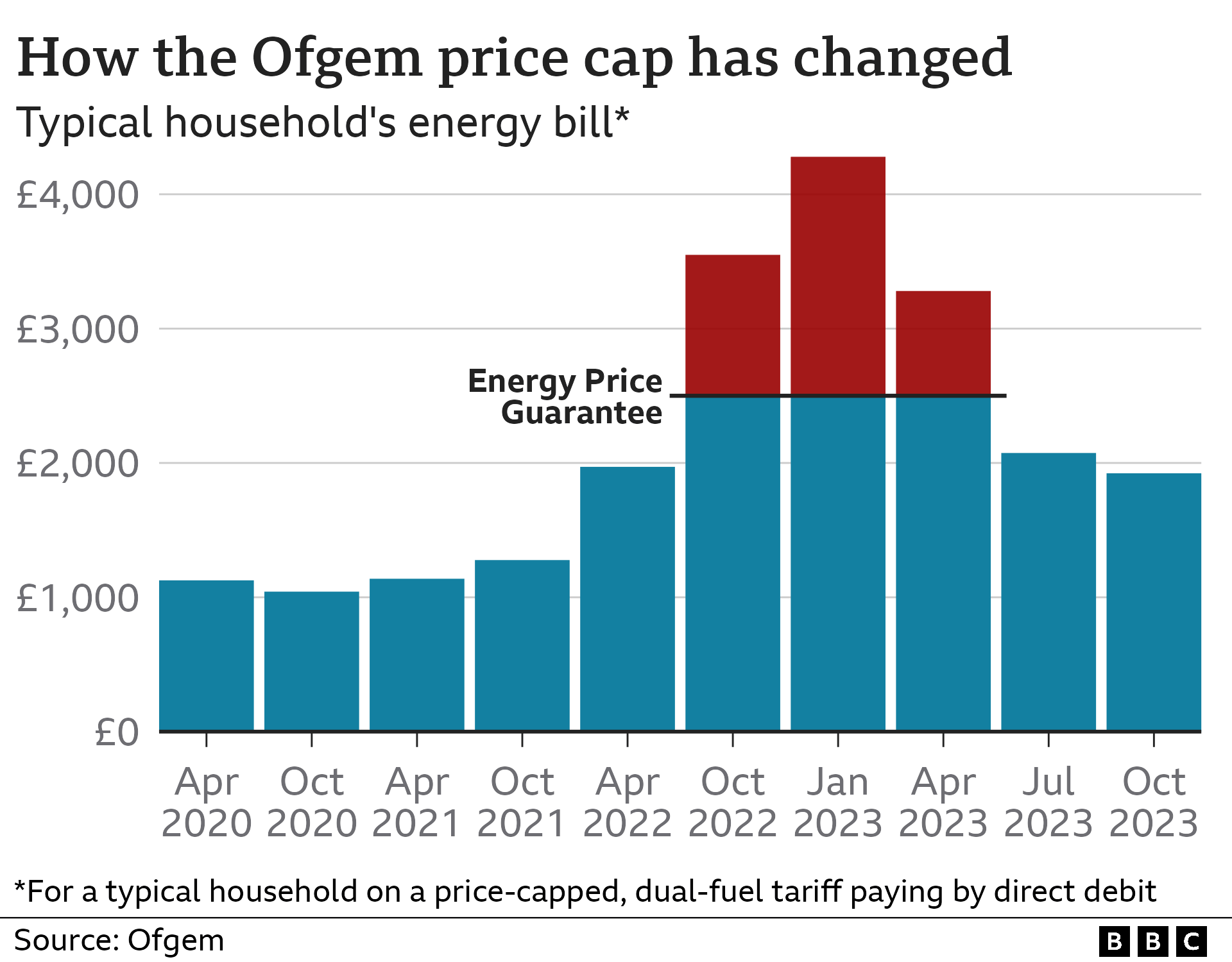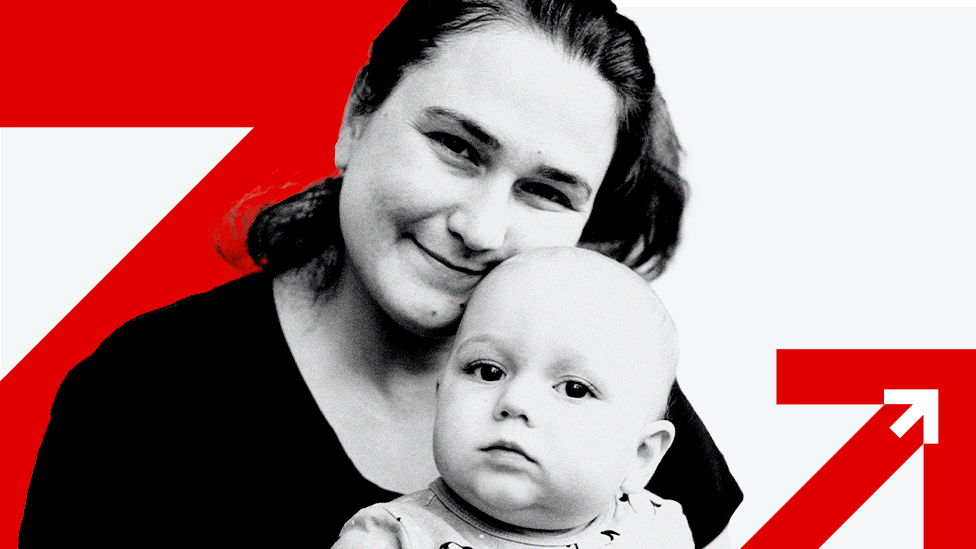Energy bills drop slightly for winter but will remain high
- Published

An annual energy bill for a household using a typical amount of gas and electricity will fall to £1,923 in October under regulator Ofgem's new price cap.
Bills will be £151 lower than current rates and £577 down on last winter.
But many people will see little difference in what they pay despite the fall because some government support has been withdrawn.
Charities said the government must protect the most vulnerable households.
Average annual gas and electricity bills remain high by historical standards. In winter 2021, an energy bill for a typical household was £1,277.
Analysts also suggest that prices could rise again at the start of next year.
Ofgem chief executive Jonathan Brearley said: "We know people are struggling with the wider cost of living challenges and I can't offer any certainty that things will ease this winter."
Volatility in the market gave little long-term certainty to customers, he said.
How the price cap works
Ofgem's price cap affects 29 million households in England, Wales and Scotland. It sets the maximum amount that suppliers can charge for each unit of gas and electricity but not the total bill. If you use more, you will pay more.
For a home using a typical amount of gas and electricity and paying by direct debit, the current annual bill is £2,074. This will fall to £1,923 between 1 October and 31 December.
Specifically, the price of gas will fall from 7.5p per kilowatt hour (kWh) now to 6.89p for the final three months of the year. The price of electricity will fall from 30.1p per kWh to 27.35p.
The typical bill is calculated on an estimate that the average household uses 2,900 kWh of electricity and 12,000 kWh of gas.
Those who pay bills every three months, often by cheque - known as standard credit - will pay £129 more a year than those using direct debit.

Domestic energy bills will be lower than the £2,500 a year paid last winter and spring, when the government stepped in to limit further rises. Prices rose following Russia's invasion of Ukraine.
But last winter's government-funded £400 discount to every household, which was paid in six instalments between October and March, has finished and will not be repeated.
Adam Scorer, from charity National Energy Action, said costs would be higher for many if the weather is colder than last year.
"Millions will still face unaffordable bills this winter and we are concerned about a mood of complacency. Government must remain laser focused on the risk of vulnerable households struggling in cold homes this winter," he said.
Citizens Advice called for more targeted government support for those who need it most. The charity said the number of people getting in contact for advice about paying energy bills jumped by 17% in the first half of this year.
Ofgem's Mr Brearley said that social tariffs, for lower-income households, should be considered as a future option.
Asked about families being concerned they will again struggle to pay their bills this winter, Prime Minister Rishi Sunak said the government was working "night and day to ensure the money in people's pockets goes further".
"I want to make sure the most vulnerable in our society do get help, even when prices are coming down," he said.
Standing charges
Meanwhile, households are paying more for standing charges, which are a fixed daily payment covering the costs of supply and other levies.
They are also capped and part of the typical energy bill but, because they are fixed, consumers have no way of reducing them even if they cut back on energy use.
Ofgem officials said that the latest rise was the result of a higher rate of inflation. That meant suppliers' operating costs, such as running call centres, were higher. Mr Brearley said that it was difficult to shift some of these costs onto usage prices.
The average standing charge for electricity will be 53.37p per day from October. For gas customers, it will be 29.62p per day.
'Catching up'
Jay Cross, who runs a barbers shop, said he and his wife Andrea found their direct debits were failing to cover their bills last year.
"We ran over on the bills and then made payment plans to catch up with it," he said.

Andrea and Jay say they have energy debts
"We've got no choice, we've got to have the heating on - especially with the baby. We're still in arrears but we are going to get back on top of it ready for this winter."
Analysts suggest domestic energy bills are unlikely to fall significantly for the next decade.
Shadow climate change secretary Ed Miliband said higher energy bills were "here to stay" and that Labour would bring in a "proper windfall tax".
Meanwhile, Liberal Democrat MP Wera Hobhouse said high bills reflected a "shocking failure" by ministers.
Cost-of-living payments will continue to be made to people on lower incomes and those receiving certain benefits to help with high bills.

Here are some energy saving ideas from environmental scientist Angela Terry, who set up One Home, a social enterprise that shares green, money-saving tips:
Get a water-efficient shower head free of charge from your water company and use showers rather than baths
Consider loft insulation, which she says costs around £680 for a typical semi-detached home and could save £285 a year on gas bills
Hang out washing instead of using a tumble dryer, and walk instead of drive when possible
Use windy days to feel where draughts are in the house. Wetting the back of your hand helps to locate them, then use insulation or draught-proofing tape
Where available, press the smaller button to use less water to flush the toilet


What are your experiences with the cost of energy? Get in touch by emailing haveyoursay@bbc.co.uk, external.
Please include a contact number if you are willing to speak to a BBC journalist. You can also get in touch in the following ways:
WhatsApp: +44 7756 165803
Tweet: @BBC_HaveYourSay, external
Please read our terms & conditions and privacy policy
If you are reading this page and can't see the form you will need to visit the mobile version of the BBC website to submit your question or comment or you can email us at HaveYourSay@bbc.co.uk, external. Please include your name, age and location with any submission.
Related topics
- Published24 August 2023

- Published15 February 2024

- Published3 April 2024

